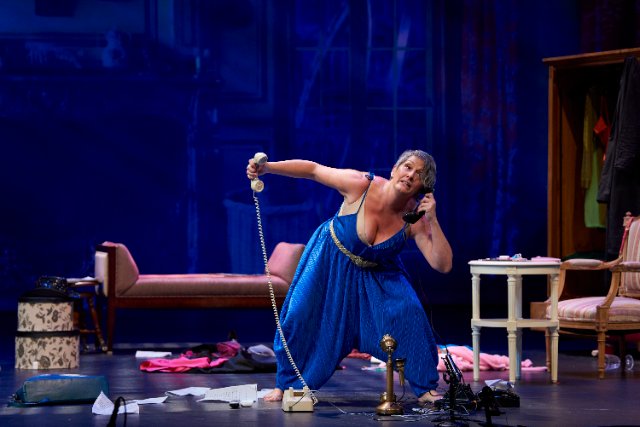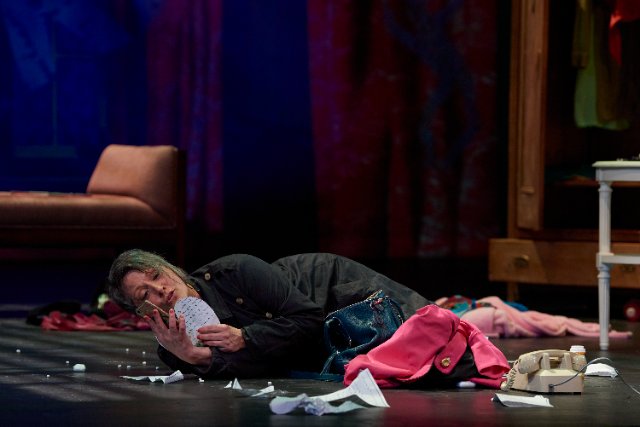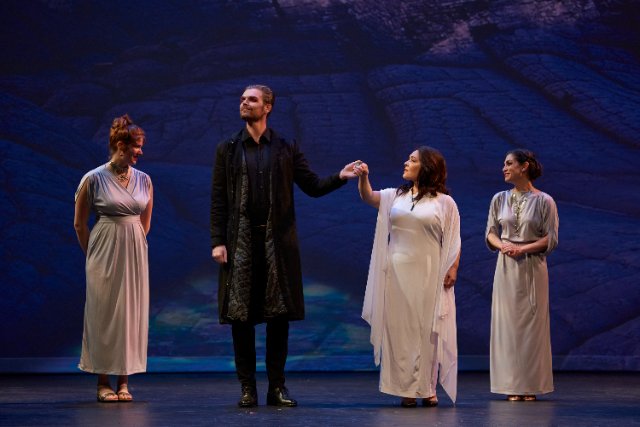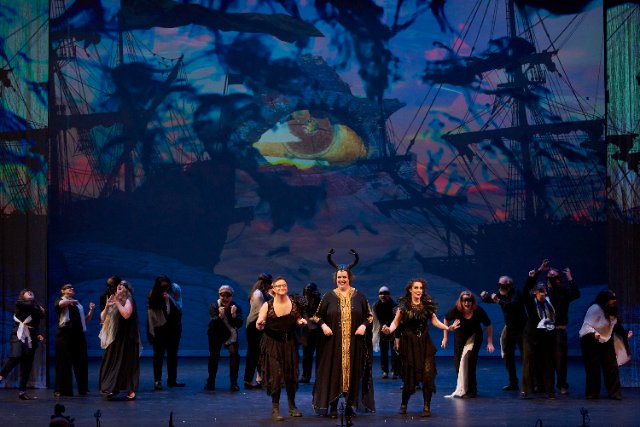La Voix Humaine and Dido & Aeneas
Festival Opera Fine Production of Divergent Works
By: Victor Cordell - Jul 14, 2024
Certain themes recur in all forms of fiction, from short stories to opera, and one is the woman scorned. Separated by over a quarter of a millennium, two short operas, Henry Purcell’s “Dido and Aeneas” (1688) and Francis Poulenc’s “La Voix Humaine” (“The Human Voice,” 1958) share this subject. However, the two operas diverge structurally. “Dido and Aeneas” requires a full cast, chorus, and reduced orchestra to tell its story in three acts. “La Voix Humaine” uses a solo performer in one act. While the composer scored it for a full orchestra, Festival Opera’s piano accompaniment, which has precedent in other productions after the composer’s death, suits the intimacy of the narrative.
Both stories are female-dominant, but the characterizations differ considerably, though they both include suicide features. Dido is not simply a strong character but the Queen of Carthage, the action occurring in ancient times. Elle (she), the unnamed woman in “La Voix Humaine,” is a contemporary commoner who is flamboyant but ultimately needy (“You were the air that I breathed.”)
“La Voix Humaine,” a minor piece by a second-tier composer, opens the double bill. Few things are more satisfying than attending a performance with low expectations and having your socks blown off. The opera with a seriously limiting conceit holds the interest for its full 40 minutes. Soprano Carrie Hennessey is primarily a recital singer rather than a production artist, and the opera world is less for it. She portrays Elle in stunning bravura fashion, with exquisite singing and outstanding acting, from frivolity to despair. She absolutely sparkles for the duration without respite, and even her French diction is clear (meaning that she is probably not French!).
The storyline is that Elle receives a phone call from her lover, but there are frequent interruptions and disconnects. We view and hear only Elle. Along the way, she reveals that she has lied to her lover and had tried to commit suicide the night before. She infers that he is now with another woman, and at the conclusion, puts the telephone cord around her neck to simulate self-destruction, but the ending is ambiguous.
To create a dynamic feel, Hennessey struts around flailing with her wardrobe and makeup and with cell and dial phones. Her facial expressions and gesticulations are dramatic and engaging. Most importantly, she navigates Poulenc’s vocal lines with precision. While much of the score is recitative or arioso-like with considerable acapella tracts, Hennessey makes the most of those and occasionally blasts a brief melodic line, displaying uncommon power and resonance. A performance like this makes seeing this little gem well worthwhile.
“Dido and Aeneas” was Purcell’s only true opera. Despite its brevity at a one-hour run time and that it was written for and first performed by a girl’s school (!), it is regarded as a major contribution to the baroque opera canon. Its music, albeit with considerable repetition, is a fine representation of its period. The action can be a bit stilted and static at times, but the choristers and projections create needed visual depth.
The widow Dido is Queen of Carthage and the visiting Aeneas the leader of Troy. A sorceress upends their proposed marriage by creating a ruse to divert Aeneas from Carthage, and Dido commits suicide, nullifying her previous image as a woman of strength while demonstrating the shallowness of many opera librettos. It should be noted that like virtually all operas and literature until more recent times, the story was written from the viewpoint of a man.
Kindra Scharich is a fine Dido, though she doesn’t hit her high until the ultimate, but most significant aria, the beautiful, heart-wrenching lament “When I am laid in earth.” Matthew Lovell cuts an imposing Aeneas, but his voice is a bit cloaked, robbing it of full power. The most captivating performer, both for her role depiction and her singing, is Sara Couden. The deep-voiced contralto plays the Sorceress to the hilt.
The surprise standouts in this production are the chorus and orchestra. The vocal balance, mellifluousness, and strength of the chorus is a surprise for a company of this size. It is outstanding. And Purcell gives them a lot of work throughout the piece, perhaps wanting to put a large number of the schoolgirls on the stage. Highlights include “Cupid only throws the dart,” and the conclusion, “With drooping wings.” The eight-piece orchestra conducted by General Director Zachary Gordin creates a rich and beautiful Baroque sound, aided by the use of period instruments, the harpsichord, theorbo, and Baroque guitar.
Céline Ricci stage directs both operas to fine effect. Although the costumery of “Dido and Aeneas” is updated, its Roman roots are well-suited for a bare-stage production, with backdrop projections. Movement of the ever-present chorus provides needed energy on the stage.
In addition to its dedicated projections, “La Voix Humaine” contains bedroom props that give the staging sizzle, and Hennessey’s movement and interaction with apparel and telephones create liveliness. My only objection is that the staging contains multiple dial phones as well as a cell phone, so confusion is created as to when the piece takes place. It is often unclear whether Elle is talking to her lover on the phone or to herself off of the phone as she never holds on to them except in passing.
Regrettably this well-selected twosome of operas plays for only two performances on one weekend, so reviews and word of mouth can’t contribute to enhancing audience support for this production. However, the word is out to be on the lookout for Festival Opera’s future offerings.
“La Voix Humaine” composed by Francis Poulenc with libretto by Jean Cocteau and “Dido and Aeneas” composed by Henry Purcell with libretto by Nahum Tate based on Virgil’s “Aeneid” is produced by Festival Opera and played at Lesher Center for the Arts, 1601 Civic Drive, Walnut Creek, CA through July 14, 2024.




